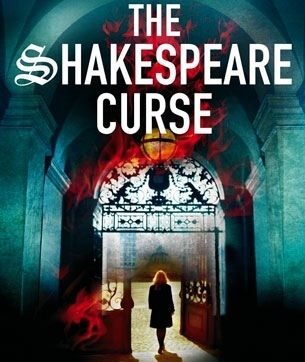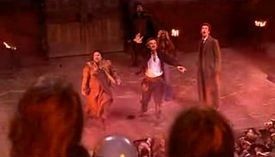The last book I read, The Passage by Justin Cronin, took me a month to read.
This book, The Shakespeare Curse, took me 72 hours. That’s not a good sign. Not good at all. I like to lose myself in a book, to live, breathe, love and bleed with the characters I share my reading with. I like to immerse myself in the narrative, care for characters, feel their relationships grow and develop.
I could barely remember who was who in The Shakespeare Curse. Perhaps this was the effect of too many mince pies over Christmas or early onset senility. Perhaps it was the fact that Carrell’s characters were so wholly one dimensional that they were essentially interchangeable.
I had some hopes for this book when I picked it up. I love Shakespeare as both an historical character and a writer; MacBeth is one of my favourite plays; a thriller in which modern murders are somehow based on MacBeth had promise.
Not a whole lot of promise! But some.
I was only really looking for a light post-Yuletide no-brainer thriller.
What I got was Kate Stanley, a heroine so monumentally stupid that I was rooting for the bad guys to finish her off! She is a Shakespeare scholar turned director who discovered a lost Shakespeare manuscript in the previous The Shakespeare Secret. Appearing not to want to waste a basic plot by only using it once, Carrell regurgitates it here: Kate was summoned to Scotland to locate a missing version of MacBeth on behalf of Lady Nairn a famous retired Shakespearean actress.
I can forgive Carrell the repeated plot. She’s in good company. Shakespeare recycled his own and other people’s plots.
The problem is that there is only plot here. There is no narrative, just plot.
The most absurd point occurred almost exactly half way through on page 178 out of 338 in my edition. Out of thin air and a propos of nothing, Lady Nairn mentions that she has an evil niece, Carrie Douglas.
Later she hands over an iPod containing a digital copy of a lost performance of MacBeth. There’s no explanation of how she got it. And it just happens to have a vital clue in it.
The best parts of this novel are perhaps the interludes around Dr John Dee, the Elizabethan polymath and occultist. The parallels between theatre and the occult were interesting: the performance as ritual; players summoning and conjuring the semblance of Kings and heroes from the past; the dangerous nature of the Renaissance stage. But it was nothing that hasn’t been played with before: the Theatre and Globe were alleged by Carrell to have been made to Dee’s occult design to conjure within. An episode of Doctor Who entitled The Shakespeare Code showed The Globe’s structure and Shakespeare’s words summoning ancient alien Carrionites.
As a thriller, this book did not work: I cared so little for Kate or Lady Nairn that the plot held no thrill. There was no twist to surprise me.
As a lover of Shakespeare, I found the hints that he derived his power from a magical rite mildly offensive. His poetry and language has power from its muscular, human heart not derived from an occultist rite!
This was a novel driven solely by plot and bereft of all those things that make Shakespeare wonderful: character, narrative, growth or humanity.
I’m sorry, J. L. Carrell, I wanted to like this book but just couldn’t!




[…] first and definitely least enjoyable book of the year: The Shakespeare Curse by J. L. Carrell. Do you like Shakespeare? Or thrillers? Or characters? Or a plot? If you answered […]
LikeLike